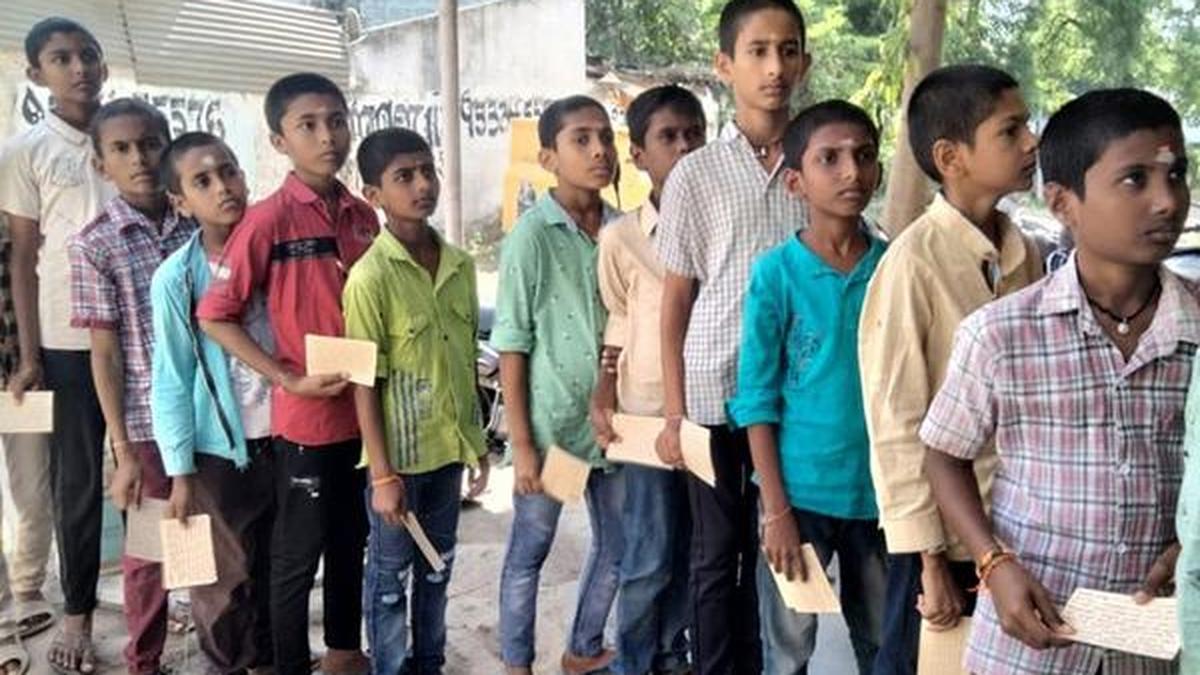
Students’ postcard push to reform school education Premium
The Hindu
Students across Telangana unite in a postcard campaign urging the Chief Minister to address critical issues in government schools.
Dear Chief Minister, our school lacks adequate security measures, leaving our belongings vulnerable to theft. We humbly request the recruitment of Class-IV employees to safeguard our school premises.”
This poignant appeal has surfaced from the corridors of a government school in Telangana’s Mahabubnagar district, penned by class 8 student N. Srinidhi.
G. Aravind, a student of another school in the same district, echoes similar concerns in his letter to the Chief Minister — need for improved infrastructure, mainly toilets with sweepers, running water for the toilets, better security, lab equipment, library resources, and transportation facilities for students from neighbouring villages.
Such impassioned pleas have found resonance beyond the confines of Mahabubnagar; more than 20,000 postcards have been sent from various corners of Telangana to the CM’s office in Hyderabad, the State capital. Students from even the remotest villages, nestled within the hinterlands of Agency areas in Kumaram Bheem Asifabad and Mulugu districts, have fervently voiced their concerns and appealed for intervention.
Echoing this sentiment across Telangana is a State-wide student-led postcard campaign, spearheaded by a non-profit think-tank called ‘Dial Your Village’ (DYV) being run by Telangana NRIs. The campaign, which commenced on January 19 this year, aims to spotlight pressing issues in educational institutions in the State.
Originating from the Telangana movement, DYV, initially comprising NRIs, shifted focus to comprehensive development initiatives following the State’s formation in 2014. Notably, their ‘Dial Your Sarpanch’ programme, which directly addressed village-level issues, showcased their dedication to grassroots development. Over the span of four years, the organisation facilitated weekly discussions involving experts from various fields, shedding light on concerns ranging from education and healthcare to agriculture.
Central to the ongoing campaign is the critical analysis of government schools across Telangana. With 30,108 government institutions, including Gurukuls (residential schools run by Social Welfare, Tribal Welfare, and Minority Welfare departments) and Kasturba Gandhi Balika Vidyalayas, the educational framework grapples with severe shortage of teachers, apart from deficiencies in infrastructure and essential amenities such as toilets, additional classrooms, libraries, and laboratories. Recent reports, including the Performance Grading Index compiled by the Central government, underscore the magnitude of these challenges, leading to Telangana’s low standing in terms of overall performance and infrastructure advancement.

“Writing, in general, is a very solitary process,” says Yauvanika Chopra, Associate Director at The New India Foundation (NIF), which, earlier this year, announced the 12th edition of its NIF Book Fellowships for research and scholarship about Indian history after Independence. While authors, in general, are built for it, it can still get very lonely, says Chopra, pointing out that the fellowship’s community support is as valuable as the monetary benefits it offers. “There is a solid community of NIF fellows, trustees, language experts, jury members, all of whom are incredibly competent,” she says. “They really help make authors feel supported from manuscript to publication, so you never feel like you’re struggling through isolation.”

Several principals of government and private schools in Delhi on Tuesday said the Directorate of Education (DoE) circular from a day earlier, directing schools to conduct classes in ‘hybrid’ mode, had caused confusion regarding day-to-day operations as they did not know how many students would return to school from Wednesday and how would teachers instruct in two modes — online and in person — at once. The DoE circular on Monday had also stated that the option to “exercise online mode of education, wherever available, shall vest with the students and their guardians”. Several schoolteachers also expressed confusion regarding the DoE order. A government schoolteacher said he was unsure of how to cope with the resumption of physical classes, given that the order directing government offices to ensure that 50% of the employees work from home is still in place. On Monday, the Commission for Air Quality Management in the National Capital Region and Adjoining Areas (CAQM) had, on the orders of the Supreme Court, directed schools in Delhi-NCR to shift classes to the hybrid mode, following which the DoE had issued the circular. The court had urged the Centre’s pollution watchdog to consider restarting physical classes due to many students missing out on the mid-day meals and lacking the necessary means to attend classes online. The CAQM had, on November 20, asked schools in Delhi-NCR to shift to the online mode of teaching.









